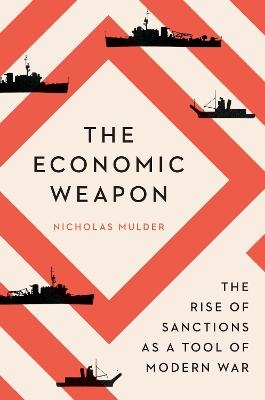
The Economic Weapon
The Rise of Sanctions as a Tool of Modern War
Seiten
2022
Yale University Press (Verlag)
978-0-300-25936-0 (ISBN)
Yale University Press (Verlag)
978-0-300-25936-0 (ISBN)
The first international history of the emergence of economic sanctions during the interwar period and the legacy of this development
A Foreign Affairs Best Book of 2022
“Valuable . . . offers many lessons for Western policy makers today.”—Paul Kennedy, Wall Street Journal
“The lessons are sobering.”—The Economist
Economic sanctions dominate the landscape of world politics today. First developed in the early twentieth century as a way of exploiting the flows of globalization to defend liberal internationalism, their appeal is that they function as an alternative to war. This view, however, ignores the dark paradox at their core: designed to prevent war, economic sanctions are modeled on devastating techniques of warfare.
Tracing the use of economic sanctions from the blockades of World War I to the policing of colonial empires and the interwar confrontation with fascism, Nicholas Mulder uses extensive archival research in a political, economic, legal, and military history that reveals how a coercive wartime tool was adopted as an instrument of peacekeeping by the League of Nations. This timely study casts an overdue light on why sanctions are widely considered a form of war, and why their unintended consequences are so tremendous.
A Foreign Affairs Best Book of 2022
“Valuable . . . offers many lessons for Western policy makers today.”—Paul Kennedy, Wall Street Journal
“The lessons are sobering.”—The Economist
Economic sanctions dominate the landscape of world politics today. First developed in the early twentieth century as a way of exploiting the flows of globalization to defend liberal internationalism, their appeal is that they function as an alternative to war. This view, however, ignores the dark paradox at their core: designed to prevent war, economic sanctions are modeled on devastating techniques of warfare.
Tracing the use of economic sanctions from the blockades of World War I to the policing of colonial empires and the interwar confrontation with fascism, Nicholas Mulder uses extensive archival research in a political, economic, legal, and military history that reveals how a coercive wartime tool was adopted as an instrument of peacekeeping by the League of Nations. This timely study casts an overdue light on why sanctions are widely considered a form of war, and why their unintended consequences are so tremendous.
Nicholas Mulder is an assistant professor of modern European history at Cornell University and regular contributor to Foreign Policy and The Nation.
| Erscheinungsdatum | 11.03.2022 |
|---|---|
| Zusatzinfo | 15 b-w illus. |
| Sprache | englisch |
| Maße | 156 x 235 mm |
| Themenwelt | Geschichte ► Teilgebiete der Geschichte ► Wirtschaftsgeschichte |
| Sozialwissenschaften ► Politik / Verwaltung ► Staat / Verwaltung | |
| Wirtschaft ► Volkswirtschaftslehre ► Wirtschaftspolitik | |
| ISBN-10 | 0-300-25936-0 / 0300259360 |
| ISBN-13 | 978-0-300-25936-0 / 9780300259360 |
| Zustand | Neuware |
| Informationen gemäß Produktsicherheitsverordnung (GPSR) | |
| Haben Sie eine Frage zum Produkt? |
Mehr entdecken
aus dem Bereich
aus dem Bereich
Macht und Herrschaft im Zarenreich
Buch | Hardcover (2024)
C.H.Beck (Verlag)
49,90 €
wie die USA und China um die technologische Vorherrschaft auf der …
Buch | Hardcover (2023)
Rowohlt (Verlag)
30,00 €


